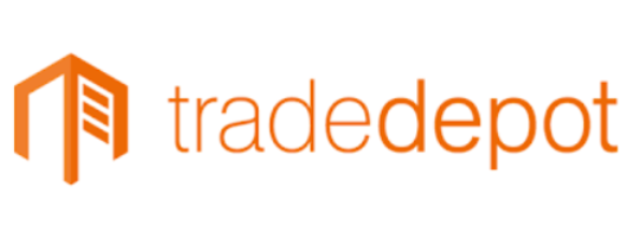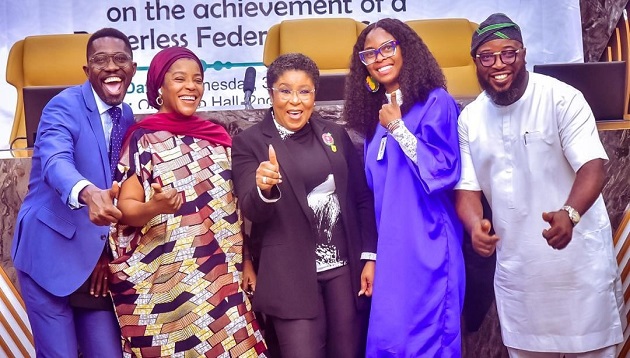E-Business
TradeDepot Secures Additional $10M to Transform Informal Retail Supply Chain in Nigeria

TradeDepot, the B2B eCommerce platform for consumer goods in Africa, has raised a further $10 million in a pre-Series B equity round co-led by Partech, International Finance Corporation, Women Entrepreneurs Finance Initiative (We-Fi) and MSA Capital. This is in addition to the $3 million Series A led by Partech in 2018.

TradeDepot will use the new investment to continue its integration of the fragmented informal retail supply chain in Nigeria, expand into other African cities and launch a suite of financial products and credit facilities, to support its retailers
Since its launch in 2016, TradeDepot has built a network of more than 40,000 micro retailers in Nigeria. Working with global distributors and manufacturers including Nestlé, Unilever, GB Foods and Danone, TradeDepot makes household supplies, such as milk, soap, detergent and other essentials more accessible and affordable for the informal urban retail networks it operates in.
Retailers order and pay for goods using TradeDepot’s mobile apps (Android and Whatsapp), USSD or a toll-free number and have them delivered directly to their stores via the company’s fleet of vans and tricycles.
They can also order stock and manage their inventory online, with a number of ways to pay, including digital payments and cash. For consumer goods brands, TradeDepot enables direct-to-retail distribution in the massive informal sector in some of Africa’s busiest cities.
TradeDepot also provides a CRM and data management system that enables suppliers to plan and monitor their sales routes in real time, as well as gain invaluable insights into trade and retail data.
Working with TradeDepot, retailers across Nigeria have increased their revenue and improved their business outcomes as a result of better access to products for their stores. One retailer grew the amount of sales transacted by more than 15x.
Another retailer who was barely breaking even and had seen no real growth in 15 years was able to increase her net monthly margin by almost 100 percent monthly, hire three new employees and is now considering expansion.
Using data and analytics to inform better retail decision making at each stage of the supply chain, TradeDepot has recorded considerable growth since its launch, activating a new store every three minutes, and receiving a retailer order every 4 seconds, on average. The company has also tripled its volume of trade in the last 12 months.
Onyekachi Izukanne, Chief Executive Officer and co-founder of TradeDepot says, “We are excited to strengthen our team and welcome on board some incredible strategic investors and partners, as we double down on our mission to digitize and simplify retail distribution for the continent. Africa’s offline retail market is estimated at $1 trillion, and this new investment allows us to capture an even greater segment of that market.
“We will continue to use data to drive efficiencies and provide an easier stock acquisition service for our 40,000+ retailers, driving down costs for them by negotiating even better deals with our global manufacturing partners, whilst simultaneously providing a better, faster route to market for our suppliers.”
In a bid to help retailers grow their businesses, TradeDepot is set to launch a suite of financial products and credit facilities. Many retailers do not have the collateral that banks demand but by leveraging their trading relationship with TradeDepot, retailers can access the funds they need to buy more goods, scale their businesses and generate more revenue.
Wale Ayeni, Head of Africa Venture Capital Investment at IFC adds, “TradeDepot is a rising star in the African internet landscape, helping digitize a substantial underserved informal retail segment, which is the pillar of economic growth in Africa. The founders’ vision to build a digital platform that improves the unit economics of serving the mass-market is one that we feel privileged to support.”
More than 75 percent of the retailers on TradeDepot’s platform are female entrepreneurs and TradeDepot will offer mentorship and opportunities to link with domestic and global markets, to further support its predominantly female customer base to grow and expand their own businesses.
Hanh Nam Nguyen, Program Manager, speaking on behalf of IFC as implementing partner of We-Fi, said, “Women play a pivotal role in driving economies across Africa, but lack of access to capital, limited market linkages, cultural norms and other challenges often prevent them from achieving the success they want.
“We-Fi financing will incentivize TradeDepot to build stronger women-led small and medium enterprises (SME) retailer and distributor networks, which will support them to become drivers of economic growth in their communities.”
Tidjane Dème, General Partner at Partech said, “we are proud to continue our partnership with TradeDepot as they continue their work to transform the huge informal markets that are present in Africa.
The founders have a wealth of experience that puts them in a great position to execute on their vision, and their approach and results to-date are why we are so excited by the extraordinary entrepreneurs harnessing the power of technology to address issues across the continent.”
Ben Harburg, Managing Partner at MSA Capital said, “TradeDepot is leading the digitization of informal enterprise across West Africa at the most critical touch point – the distribution and sale of essential foodstuffs by SME retailers – driving efficiency improvements, increased service offerings, and costs savings to both consumers and merchants.”
E-Business
Galaxy Backbone Celebrates the Federal Government’s Paperless Civil Service Milestone

Galaxy Backbone (GBB) aligns with and celebrates the successful announcement by the Office of the Head of the Civil Service of the Federation on the achievement of a Paperless Civil Service, a significant milestone in Nigeria’s public sector reform and digital transformation agenda.

The milestone was formally highlighted at a press briefing led by the Head of the Civil Service of the Federation, Mrs. Didi Esther Walson-Jack, who commended Galaxy Backbone for its sustained support and contribution throughout the implementation of the programme.
GBB has played a critical role in enabling this transition by providing secure, scalable, and shared digital infrastructure that supports the digitisation of government processes across Ministries, Departments and Agencies (MDAs). Through the 1Government Cloud, MDAs have been empowered to migrate from paper-based workflows to digital platforms, improving efficiency, collaboration, data security, and service delivery across the Federal Civil Service.
In addition, GovMail, GBB’s secure government email platform, has strengthened official communication, enhanced records management, and reinforced cybersecurity standards—key pillars in sustaining a paperless operating environment.
Galaxy Backbone acknowledges the collective efforts of the Office of the Head of the Civil Service of the Federation, Permanent Secretaries, Directors of ICT, consultants, partners, and dedicated public servants whose commitment and collaboration ensured the smooth delivery of this initiative.
The Managing Director/Chief Executive Officer of Galaxy Backbone, Prof. Ibrahim Adeyanju, was represented at the press briefing by Akintayo Bamisaye, Acting Group Head, Research, Digital Innovation and Skills Department (RDIS).
GBB describes the achievement as a strong close to 2025 and reaffirms its commitment to supporting the Federal Government in building a modern, efficient, and digitally enabled public service.
E-Business
Jumia CEO says Black Friday Signals Nigeria’s E-Commerce Maturity

At the close of 2025, Temidayo Ojo, the CEO of Jumia Nigeria, reflected on a year-end shopping season that points to the growing maturity of the country’s e-commerce market. “Black Friday is no longer a single, short-lived spike in activity,” he said.

“It has become a familiar, anticipated moment in the retail calendar, where consumers shop deliberately and with confidence.”
Preliminary KPIs for the two months ended November 30, 2025, show strong year-on-year growth in both orders and Gross Merchandise Value (GMV), with GMV growth outpacing order growth. This indicates that customers are placing fuller, more considered baskets rather than shopping in fragmented transactions. Nigeria ranked among Jumia Group’s better-performing markets, with engagement remaining steady throughout the Black Friday period rather than spiking briefly and tapering off.
A key factor behind this performance is the growing familiarity of consumers with online shopping. Customers are increasingly leveraging platform features such as saved carts, brand stores, and price comparison tools to plan purchases in advance. This trend suggests that digital commerce is becoming embedded in everyday habits rather than being viewed as a one-off event.
Ojo also highlighted the role of Jumia’s JForce network in connecting digital commerce to local communities. “Our agents are critical to ensuring that customers across Nigeria, including secondary cities and smaller communities, have access to variety, consistent pricing, and reliable delivery,” he said. “During peak periods like Black Friday, JForce agents can respond faster, serve more customers efficiently, and build stronger local relationships. This isn’t just a distribution channel—it’s a pathway to sustainable income and inclusion.”
Reflecting on the overall performance, the CEO concluded: “What we’re seeing this year-end is steady engagement across categories, stronger consumer confidence, and partners like our JForce agents benefiting from increased activity.
“It confirms that Nigeria’s e-commerce ecosystem is maturing, growing in a more structured and resilient way. As the December Holiday Sale continues, we expect these patterns of familiarity, trust, and participation to sustain momentum and drive both commerce and community impact across the country.”
E-Business
Galaxy Backbone Tops FG’s Website Performance Ranking

Galaxy Backbone Limited (GBB) has been ranked first overall in the 2025 Federal Government Website Performance Scorecard.

This is a landmark achievement for Nigeria’s digital economy.
The ranking, conducted by the Bureau of Public Service Reforms (BPSR), is the definitive benchmark for digital excellence and transparency across all Ministries, Departments, and Agencies (MDAs).
Professor Ibrahim Adepoju Adeyanju, managing director and CEO of Galaxy Backbone, received the award during a ceremony in Abuja.
He described the feat as a validation of the agency’s“Nigeria First”data sovereignty strategy and its relentless pursuit of service excellence.
This recognition comes as the Federal Government intensifies its push to achieve a fully paperless civil service by December 31, 2025.
GBB has been the primary architect of this transition through its 1Gov Enterprise Content Management (ECM) platform, which now hosts the operations of almost all federal MDAs.
The award adds to a growing list of accolades for Galaxy Backbone in 2025, following its recent win of the “International Standard Excellence Award for Best IT Service Provider.”
As the central hub for government shared services, GBB’s performance serves as a blueprint for other agencies currently undergoing digital transformation.
With its expanded fiber-optic backbone now covering over 13 states and its secure cloud solutions, Galaxy Backbone remains the cornerstone of Nigeria’s vision to become a leading digital nation by the end of the decade.

 Telecom3 days ago
Telecom3 days agoNnaemeka Ani – The Architect of ‘Code and Courage’

 E-Financial3 days ago
E-Financial3 days agoNigeria’s N58.18trn Budget and Rising Cost of Deficit Governance

 Telecom3 days ago
Telecom3 days agoMTN Nigeria Appreciates Partners, Customers at Lagos Prestige Experience

 Telecom2 days ago
Telecom2 days agoT2 Faces NCC Probe in Benue Over Major Service Outage in 9 LGAs

 Telecom2 days ago
Telecom2 days agoMTN Nigeria Crowns Ayo Benzi Winner of Next Afrobeats Star

 Telecom2 days ago
Telecom2 days agoNCC Grants 45 Days for Telecoms Firms to Fix Unapproved Shareholding Changes

 E-Business2 days ago
E-Business2 days agoJumia CEO says Black Friday Signals Nigeria’s E-Commerce Maturity

 Telecom2 days ago
Telecom2 days agoNCC Unveils Draft 5-Year Spectrum Roadmap, 60 GHz License-Exempt Guidelines to Boost Broadband, Innovation
























